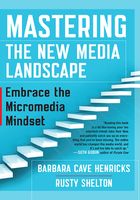
2 TECHNOLOGY GIVES RISE TO NEW RULES OF COMMUNICATION
TOM RATH IS A STATISTICIAN AT HEART. Someone who, despite the break-out success of books like StrengthsFinder 2.0, and How Full Is Your Bucket?, remains a well-mannered Midwesterner who prefers to fly under the radar and could live happily off the grid. So imagine our trepidation when, at long last, we convinced him to do some desk-side briefings in New York, and Tom’s sense of polite protocol and technology went head-to-head.
Barbara was gleefully shuttling Tom to media appointments when the unthinkable happened during a lunchtime chat with a reporter from Fortune. Unable to simply turn off her smartphone lest a journalist need to reach her and shuffle the day’s schedule, Barbara found herself staring at Tom’s mortified face when the phone’s insistent vibrating began to make the tabletop quiver. A quick glance at the screen revealed a local area code, so Barbara stepped into the hallway to attend to what seemed quite likely to be a schedule change or other piece of crucial information. The call? It was a recorded voicemail from her Manhattan hotel informing her that the time of turn-down service had been changed and would now commence at 8 p.m., rather than 9 p.m. Fortunately, Tom is a forgiving soul, but this is all too familiar a scene in our world where the rules of good communication—some might even say basic manners—seem to have been turned on their head.
Smartphone blunders are the least of it. In a recent piece in the New York Times, reporter Judith Newman explored what she called the new horrors that accompany every new piece of technology. Specifically, she details the anxiety, fear, and straight-up gaffes that happen when the auto-fill feature of email does its alleged magic. Auto-fill is that handy tool that aptly fills in names and other information in a field based on a few keystrokes. Its sister, auto-correct, does this as well, but it goes past corrections and predicts what you are writing in the body of the note. These features are great when they keep you from looking up someone’s email address for the tenth time or when you get a little dim on that spelling lesson about “a lot” always being two words. Much less so when they insert your mother’s name rather than your best friend’s in the address box of an email. Even worse is when they transform someone’s name in the body of a note into a word that’s a bit off-color or flat-out obscene. “Secrets are disclosed, petty true feelings are revealed, words (and worse, photos) of longing and lust end up in the box of your boss instead of your lover,” Newman writes. “And no one is immune.”
Specifically, she details the anxiety, fear, and straight-up gaffes that happen when the auto-fill feature of email does its alleged magic. Auto-fill is that handy tool that aptly fills in names and other information in a field based on a few keystrokes. Its sister, auto-correct, does this as well, but it goes past corrections and predicts what you are writing in the body of the note. These features are great when they keep you from looking up someone’s email address for the tenth time or when you get a little dim on that spelling lesson about “a lot” always being two words. Much less so when they insert your mother’s name rather than your best friend’s in the address box of an email. Even worse is when they transform someone’s name in the body of a note into a word that’s a bit off-color or flat-out obscene. “Secrets are disclosed, petty true feelings are revealed, words (and worse, photos) of longing and lust end up in the box of your boss instead of your lover,” Newman writes. “And no one is immune.”